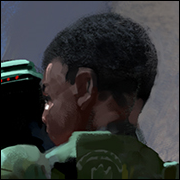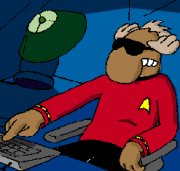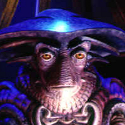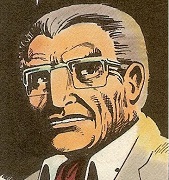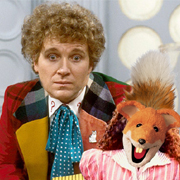|
The thing about Bester (and the Psi Corps) is that JMS seems to genuinely view telepathy as an existential threat to humanity, one that will flip a switch in people and turn them into monsters. So, Bester is Hitler, and Hitler can be pretty charming and personable. Except Bester isn't Hitler. The Earth Alliance's role in creating Psi Corps and enforcing its mandate in subjugating telepaths-by-telepaths is, with the exception of I think a single line from Garibaldi in Season 5, never actually talked about. Psi Corps isn't an arm of the Earth Alliance, one subjected to laws created by mundanes and overseen by a mundane, but this tumor of malfeasance that just seemingly sprung up out of nowhere and is cartoonishly evil. I think just about every antagonist from the Shadows to Lord Refa get a bit more sympathy than Bester and the Corps does. And then you've got guys like Edgars making an outright genocide virus. Edgars even says that there's a secret cabal of capitalists who are the real power in the Earth Alliance, and they've decided that telepaths need to be taken care of... because they're worried about telepaths taking control of the Earth Alliance. JMS just has a weird blind spot, and I feel like that's part of the reason the Telepath War has never really been detailed because the idea of the Psi Corps just... launching a coup of the Earth Alliance is a little silly. And also immediately runs into the problem that not every single person in the Psi Corps is an Alfred Bester.
|
|
|
|
|

|
| # ? May 16, 2024 02:11 |
|
Milkfred E. Moore posted:The thing about Bester (and the Psi Corps) is that JMS seems to genuinely view telepathy as an existential threat to humanity, one that will flip a switch in people and turn them into monsters. So, Bester is Hitler, and Hitler can be pretty charming and personable. Except Bester isn't Hitler. The Earth Alliance's role in creating Psi Corps and enforcing its mandate in subjugating telepaths-by-telepaths is, with the exception of I think a single line from Garibaldi in Season 5, never actually talked about. I dunno about that, I just watched an episode in early-mid season two (during that run of Talia episodes) where the command staff have a conversation about how concentrating power and fear in single institution made Psi Corps being a monster of mankind's own making. Even at this point in the series there are a handful of psychic individuals who aren't power mad psychopaths; Talia, Ironhart, that dude from Eyes in the first season, the Down Below girl from season one... so I dunno if psi powers --> monster path is quite so prescribed. It seems like the combination of the potential to abuse innate power, and the support of a fascist class system, leads people to behave monstrously, rather that some innate psi-essentialism. Sense8 was basically the same thing tbh, and JMS wrote fairly positively about this idea that humanity could develop in ways that were positive and humane, but only if they found ways to live peacefully and openly with new paradigm humanity.
|
|
|
|
Bester's mainly not like Hitler because he is a guy doing a job instead of a charismatic populist broadcasting his plans out into the world to find people to listen to him. Whatever Bester's plans for the future are, hes going to do it with his bureaucratic authority from his rank in Psi Corps. If he has a plan for anything more than segregation, it's way in the future, but he's more likely to follow a future Hitler that comes along rather than lead the charge himself (and of course, the Psi Corps was heavily in favor of Clark before he started selling Telepaths to the Shadows). I don't think JMS does a very good job of integrating psychic powers into the overall worldbuilding, but I think that the Psi Corps are more inhumane because of the whole structure of isolating people from any friends or family and people being pretty much raised in the care of a bunch of abusive people. A lot like a cult. Jeffrey Coombs is the nicest guy that's all for the Psi Corps, but it comes off more as him being totally naive about the Corps rather than a true believer like Bester.
|
|
|
|
Milkfred E. Moore posted:And then you've got guys like Edgars making an outright genocide virus. Edgars even says that there's a secret cabal of capitalists who are the real power in the Earth Alliance, and they've decided that telepaths need to be taken care of... because they're worried about telepaths taking control of the Earth Alliance. Edgars really moves Bester into "Magneto Was Right" territory - no matter how ruthless and evil the Corps actions are, it's hard to condemn them when they really are dealing with the threat of genocide against them. And Bester's actions in season four are a hell of a lot easier to justify than Sheridan using the Shadow teeps as suicide bombers.
|
|
|
|
Bester is clearly more of a Himmler than a Hitler.
|
|
|
|
If we subscribe to the theory that JMS had a "thing" about telepaths, it kind of fits in to the general sci-fi tropes of yesteryear. Telepaths are "more evolved" or advanced than normies, so of course they'd try to take over or destroy normies. This is a pretty common theme in a lot of old sci-fi, a bad misread of evolution shaping a fear of the unknown. But aside from the psychopathology of the author(s), the way the show presents teeps does make them seem like a threat. I'm not #teamedgars by any means, that guy was a loving nut-job too (this show is rife with these), but it's kind of a Gordion's knot. If there isn't a Corps, how do you keep teeps from becoming (even moreso) bad actors? It's immediately clear what kind of advantage reading minds would give, even if there's technobabble about deep scans or whatever. Is there a way to make a "humane" Corps? As dumb as the Byron plot is, at least those guys had a good idea, gently caress these normies, we'll go and make our own planet, with telepathy, blackjack and sex parties. Bester's mind-reader-SS is just creepy and horrifying.
|
|
|
|
sebmojo posted:Who are you, what do you want, why are you here, where are you going. This would imply that there should have been two other ancient races around that ask the cast those last two questions.
|
|
|
|
Eighties ZomCom posted:This would imply that there should have been two other ancient races around that ask the cast those last two questions. "Why are you here?" is a question Sebastian asks of Delenn.
|
|
|
|
sebmojo posted:Who are you, what do you want, why are you here, where are you going. also: where do you want to go for lunch
|
|
|
|
The telepath stuff is one of the things where I feel like Babylon 5 bridges the gap between old-school sci-fi and new sci-fi. People really thought back in the day that psychic powers were on the verge of developing in humanity at large, and they were all over older sci-fi (and honestly I'm not sure that old sci-fi did that great of a job at showing how society changes as a result either). And then it turns out that most of the reasons people thought that psychic powers were coming were elaborate frauds, so all of that dried up aside for a few artifacts that people are more likely to see as just fantasy elements rather than plausible tapping into forces modern science doesn't yet understand. sebmojo posted:Who are you, what do you want, why are you here, where are you going. https://www.youtube.com/watch?v=WLwF_0Z2KHY&t=47s
|
|
|
|
Jedit posted:"Why are you here?" is a question Sebastian asks of Delenn. While Sebastian may be old by human standards if you count the time he spent in stasis, I don't think that qualifies him to be considered an Ancient or one of the First Ones. 
|
|
|
|
SlothfulCobra posted:The telepath stuff is one of the things where I feel like Babylon 5 bridges the gap between old-school sci-fi and new sci-fi. People really thought back in the day that psychic powers were on the verge of developing in humanity at large, and they were all over older sci-fi (and honestly I'm not sure that old sci-fi did that great of a job at showing how society changes as a result either). The obvious example is Asimov's "the Mule", who more or less derails all of society with his psychic powers. Asimov's robots also wind up figuring out telepathy, but a lot of the stories portray it as either a full negative (LIAR!), or something to be guarded as a secret (Daneel and Giskard). There's Niven's Teela Brown, whose sort-of-psy-powers are (spoiler alert for a fifty-year-old book) revealed to have been the main instigator for everything that happens in the plot of Ringworld. Niven's "Known Space" also contains the Slavers, and there's some stories depicting how they ran a galaxy-wide empire with their telepathy powers while being absolute dumb-asses themselves, but granted these are not humans. But generally speaking, telepathy was seen as an enemy and as a weapon in a lot of old-school sci-fi, and Babylon 5 certainly explores aspects of telepathy being a weapon.
|
|
|
|
One of my favorite second wave or silver age or however its termed 70s scifi books is Robert Silverberg's Dying Inside, which is a story about a lone telepathic man living through the sixties in the US and its just made him a completely lonely and bitter man, and as he enters middle age he feels his "gift" leaving him. Great book!
|
|
|
|
Milkfred E. Moore posted:The thing about Bester (and the Psi Corps) is that JMS seems to genuinely view telepathy as an existential threat to humanity, one that will flip a switch in people and turn them into monsters. I don't read that at all, especially considering there are other societies in the B5 galaxy with telepaths that didn't turn into telepath-controlled hellholes. The people running away and hiding from Psi Corps don't really track as monsters either. SlothfulCobra posted:(and of course, the Psi Corps was heavily in favor of Clark before he started selling Telepaths to the Shadows). I can easily believe that there were elements of Psi Corps that were perfectly happy to sell telepaths to the Shadows in exchange for more power.
|
|
|
|
Rappaport posted:The obvious example is Asimov's "the Mule", who more or less derails all of society with his psychic powers. Asimov's robots also wind up figuring out telepathy, but a lot of the stories portray it as either a full negative (LIAR!), or something to be guarded as a secret (Daneel and Giskard). There's Niven's Teela Brown, whose sort-of-psy-powers are (spoiler alert for a fifty-year-old book) revealed to have been the main instigator for everything that happens in the plot of Ringworld. Niven's "Known Space" also contains the Slavers, and there's some stories depicting how they ran a galaxy-wide empire with their telepathy powers while being absolute dumb-asses themselves, but granted these are not humans. It's hard to imagine a functional telepath not being a threat. To my thinking it's the kind of power advantage over "mundanes" that a billionaire has.
|
|
|
|
I mean, surely someone is going to mention the real-life Al Bester's The Demolished Man, which to me seems like the closest inspiration for telepaths in Babylon 5, and involves a main character who is a paranoid industrialist trying to commit a crime in a society that is already dominated by mind-readers. It includes telepaths with different power levels organized into a guild, and even has mind-wiping as a punishment. (It's been ages so I don't know how much of this is spoiler territory and how much of it is just the premise and back cover blurb)
|
|
|
|
sebmojo posted:Who are you, what do you want, why are you here, where are you going. Who do you serve and who do you trust? It's me, I'm the one who got into B5 via watching Crusade on Sky One when i was like 12
|
|
|
|
Absurd Alhazred posted:I mean, surely someone is going to mention the real-life Al Bester's The Demolished Man, which to me seems like the closest inspiration for telepaths in Babylon 5, and involves a main character who is a paranoid industrialist trying to commit a crime in a society that is already dominated by mind-readers. It includes telepaths with different power levels organized into a guild, and even has mind-wiping as a punishment. (It's been ages so I don't know how much of this is spoiler territory and how much of it is just the premise and back cover blurb) I mean yes absolutely. That's why bester is called that. Good book, though very of its time for all its linguistic and stylistic inventiveness.
|
|
|
|
sebmojo posted:An excellent post. Delenn really gets a very easy ride, though you do get the sense that her transition is in some sense an act of repentance. Interesting thing about the original idea about her turning from male Minbari (or neuter? IIRC they hadn't decided before they dropped the idea) to female human hybrid is that it didn't surprise me o hear from JMS that it didn't get executive pushback the way that the Talia-Ivanova romance did. At the time transgender people weren't on the radar as a target for conservative groups so 'changing sex/gender' wouldn't immediately flag as political the same way it would now, and the implication of her using advanced alien technology to undergo a unique change would put it more into the 'aliens do weird stuff' category than 'this is a statement about modern humans'. Milkfred E. Moore posted:The thing about Bester (and the Psi Corps) is that JMS seems to genuinely view telepathy as an existential threat to humanity, one that will flip a switch in people and turn them into monsters... JMS just has a weird blind spot, and I feel like that's part of the reason the Telepath War has never really been detailed because the idea of the Psi Corps just... launching a coup of the Earth Alliance is a little silly. And also immediately runs into the problem that not every single person in the Psi Corps is an Alfred Bester. I think one of the old-school things that contributes to that is that telepathy is separate from the 'sciencey' add-ons to the world like FTL engines and PPGs. You don't have telepathy detectors, a simple protective device, or even a big 'tinfoil hat' construction to block mind-reading, the only defense against telepathy is to either have a telepath you can trust or kill/exile every telepath that comes near you. I think that's also part of why telepaths aren't that integrated into the world building, telepathy is on it's own magical layer instead of just being another piece of sci-fi - it's very unlike souls, which are somewhat mystical and mysterious but which we also see people interact with using technological devices. Psamtik I posted:So, I just finished a rewatch and the show was great; the movies not so much. I'm hesitating about getting the books. Are they any good? Like...closer to the TV show quality or closer to the movies quality? I don't want to waste my time if they're just trash. Running off of my memory of them from reading them 20 years ago, the Centauri Trilogy is a big deal because it finishes off the story of Londo and Viir. I feel like without it there are some significant pieces of the main story that don't get wrapped up. It also continues the theme of having to do bad stuff before becoming enlightened, since Viir does do some questionable stuff that he regrets. Psi-Corps trilogy is interesting backstory for showing how screwed up telepaths are in the B5 world, that's my main take away from it. You do find out what eventually happens to Bester, but I don't think that ties in to the main show the way the fate of the Centauri does - it's not a bad read, but it doesn't really add to the main event. The Technomage trilogy is my least favorite, it's pretty disconnected from the main series, and I didn't find the story in it very compelling. The three trilogies were the only ones I've read, and none of them are just trash - they're decently written and don't have 'throw the book against the wall' moments, but only one of them is one I'd really seek out at collector prices if I didn't already have them. Absurd Alhazred posted:I mean, surely someone is going to mention the real-life Al Bester's The Demolished Man, which to me seems like the closest inspiration for telepaths in Babylon 5, Finding out about that reference is what got me to read the real Bester's few science fiction works. Demolished man and The Stars my Destination are both good novels, but I think his short story collections are more interesting, and are definitely worth checking out if you decide to poke into those.
|
|
|
|
Rappaport posted:If there isn't a Corps, how do you keep teeps from becoming (even moreso) bad actors? It's immediately clear what kind of advantage reading minds would give, even if there's technobabble about deep scans or whatever. Is there a way to make a "humane" Corps? Admittedly I haven't read anything secondary like the novels about the Telepath War so I don't know what they had to say about it, but from what little Crusade got into it, things seemed like they were headed in a circular direction - from memory, the Psi Corp was abolished and telepath segregation ended so they could be private citizens or join Earthforce like anyone else, but there was a new telepath oversight body in place (civilian? can't remember) and when they show up in an episode it's as villain of the week abusing their powers and violating boundaries so they're pretty much Psi Cops with a new badge
|
|
|
|
Seemlar posted:Admittedly I haven't read anything secondary like the novels about the Telepath War so I don't know what they had to say about it, but from what little Crusade got into it, things seemed like they were headed in a circular direction - from memory, the Psi Corp was abolished and telepath segregation ended so they could be private citizens or join Earthforce like anyone else, but there was a new telepath oversight body in place (civilian? can't remember) and when they show up in an episode it's as villain of the week abusing their powers and violating boundaries so they're pretty much Psi Cops with a new badge Yes, the implication was both that the show would establish the problems with Psi Corps while also working through the “some of the same people are still around” issues that the series would have also covered within Earthforce. IMO, Lyta and latent telepath Ivanova invite our sympathy and refute the Corps-based model while suggesting telepaths both don’t deserve what they’ve received but can still be really drat scary. If humanity evolves into Jason Ironheart in a million years, then we all eventually evolve into telepaths. The show is pretty evasive about other races’ telepaths, but the Centauri seem to treat theirs very differently, as do the Minbari, and I read as an implication that the combination of the Psi Corps concentrating the worst in human telepaths coupled with humanity’s hatred and racism make for a toxic mix that’s only partially cleared by the Telepath War. Certainly Matheson in Crusade is trying to be a big drat hero and if we’d gotten to a season 2 he’d have been in charge for at least a while during the period that Captain Gideon was dead. Eighties ZomCom posted:This would imply that there should have been two other ancient races around that ask the cast those last two questions. Agents of Gaming added some background details and history of the other First Ones whose ships get gathered together in one of their Babylon 5 Wars supplements. I have proposed in the past that Lorien’s other questions (also including “Do you have anything worth living for?” can be applied to some of these other First Ones. In particular, the Walkers would ask “Where are you going?” Which fits with the extra-special propulsion and mapping technology the game gave them. Crusade’s “who do you serve and who do you trust” apply broadly, IMO: not just to the crew of the Excalibur, but to the Drahk and the Technomages.
|
|
|
|
Pantaloon Pontiff posted:The Technomage trilogy is my least favorite, it's pretty disconnected from the main series, and I didn't find the story in it very compelling. It was kind of... overly lengthy, but it did connect to the main story briefly in an interesting way at the end. The technology used by the technomages comes from the Shadows, although only the innermost circle knew. And not surprisingly, the Shadows had a kill switch for the stuff in case of rebellious Technomages. Anyway, there was a price to be paid -- they had to periodically give one of their number to be used to power the Eye of Z'ha'dum, since this was too much for a normal sentient being. The technomage inside the Eye had studied the technology and found a flaw. When Sheridan went to crash his ship into the capital circle, he essentially took advantage of that flaw to BSoD and reboot the defensive network of Z'ha'dum.
|
|
|
|
""A Fire Upon The Deep" has an interesting take on a concept that is somewhat related to telepathy. There's a species of dog-like creatures which lives in "packs", except each pack acts like and considers itself one mind. When the units within the pack communicate with each other, this happens through a fast-paced high pitched series of sounds which they just call "thoughts". When different packs communicate, they use a language that is slower paced and lower in pitch. On a day to day basis, a pack does everything together as a single thinking individual. They can only grab things with their mouths so they need to work together to build anything. If a pack loses one unit it feels to them like they literally lost a part of themselves, and will do anything to get them back. And if there's less than three or four dogs in a pack, they become very dumb, and will probably not survive unless they find another pack to join. And speaking of, for whatever reason units switch to another pack sometimes. That's always a bit scary because this can change a pack's personality significantly. Especially since some units tend to have a more dominant personality than others. On large gatherings, it's very important for each pack to keep distance from every other pack, because if they get close enough to hear the thoughts of another pack, at first it feels like interference in their thoughts and they can't think properly anymore, but if it keeps going and the packs intermingle they'll lose their sense of self and might come out as completely different packs/people.
|
|
|
|
That reminds me of a Heinlein story (I know, I apologize) where a bunch of humans meet an alien race who live in sort of telepathic communes like that, the commune is one mind / identity that lives forever while the individual, erm, individuals live and die and get replaced. Eventually one human decides to join a commune because it's a form of immortality, right? But then the story makes it clear that the human being was subsumed by the collective and, as a personality, died, and it's a big tragedy slash horror event. I think it's the same story that has alien "gods" who, in some unexplained way, lord over an other race of fairly dumb but nice aliens that these humans also meet. One human tries to have a meeting with a "god" and goes catatonic from a minutes-long experience with the "god". I can't remember now if it's specified that the "gods" are telepathic, per se, or just super-advanced in other ways.
|
|
|
|
Rappaport posted:That reminds me of a Heinlein story (I know, I apologize) where a bunch of humans meet an alien race who live in sort of telepathic communes like that, the commune is one mind / identity that lives forever while the individual, erm, individuals live and die and get replaced. Eventually one human decides to join a commune because it's a form of immortality, right? But then the story makes it clear that the human being was subsumed by the collective and, as a personality, died, and it's a big tragedy slash horror event. I think those are both from Methuselah's Children. Alien worlds which the Howard Families encounter before deciding to go back to Earth and see if they'll still be persecuted. The first one I remember as ... something plant-like? The person who joined shows up in Time Enough For Love, and I remember her being ... somehow stationary and maybe dryad-like. (She got her immortality at the expense of her humanity. But she did get it.) The second one, I know there's a comparison made between the aliens they actually meet and dogs. They're not exactly unintelligent, just naturally happy and subservient. I forget any and all details of the masters, but something like what you describe wouldn't surprise me as being the "oh, oh no, those gods aren't just myths, we've been interacting with the servitor species of something real and real powerful and weird." It's been a while, and they're just kind of filler, so I'm hazy on all the fine details. (I'm pretty sure Methuselah's Children started as a short story or novella before being expanded to a still not very long novel, but I haven't done a comparison of the two versions. And maybe he wrote the novel but then cut it down in size for serialization ...)
|
|
|
|
Vavrek posted:I think those are both from Methuselah's Children. Alien worlds which the Howard Families encounter before deciding to go back to Earth and see if they'll still be persecuted. Yeah, it's Methuselah's Children. I have some paper-back version with, uh, Revolt in 2100 attached, so I'm guessing this is the later version of the story that I've read. The Jockaira or whatever the name of the dog aliens was are indeed presented as domestic animals, and that's what gets our protagonist so upset, because Heinlein really had a bee up his bonnet about "thinking people" being all about 'freedom' and self-interest rather than serving anyone else. Which fits in with the narrative that telepathy is ultimately harmful or dangerous, since it gives a leg up on the other guy. I've been trying to remember, but I don't think Clarke ever touched telepathy, did he? The Monolith does have weird powers and all that, but it's not depicted in the way of Babylon 5 telepathy as far as I can recall.
|
|
|
Seemlar posted:Admittedly I haven't read anything secondary like the novels about the Telepath War so I don't know what they had to say about it, but from what little Crusade got into it, things seemed like they were headed in a circular direction - from memory, the Psi Corp was abolished and telepath segregation ended so they could be private citizens or join Earthforce like anyone else, but there was a new telepath oversight body in place (civilian? can't remember) and when they show up in an episode it's as villain of the week abusing their powers and violating boundaries so they're pretty much Psi Cops with a new badge EarthGov basically deciding that the issue with Psi Corps was that it had a PR problem and all they had to do was rebrand it somewhat, while reducing the power of telepaths as a bloc in the process, is really quite perceptive, honestly. The Metasensory Regulatory Authority is worse than the Corps in some ways, such as how monthly loyalty scans are now mandatory.
|
|
|
|
|
Rappaport posted:Yeah, it's Methuselah's Children. I have some paper-back version with, uh, Revolt in 2100 attached, so I'm guessing this is the later version of the story that I've read. It's not the most prominent feature of the book, but it is a part of Childhood's End, the powers that the nearly-transcended last born generation of humans have.
|
|
|
|
Small White Dragon posted:It was kind of... overly lengthy, but it did connect to the main story briefly in an interesting way at the end. Oh, I forgot that. Yeah there's a bit of tie-in, but it's really an explanation of one event that is neat but not really something I missed seeing in the main series. It's not like the Centauri trilogy where you see much more of what goes on with the Centauri, Alliance, Londo, and especially Vir during and after the show, it's more like the 'oh here's why the death star had an exhaust port flaw' bit in Rogue One. Carbon dioxide posted:""A Fire Upon The Deep" has an interesting take on a concept that is somewhat related to telepathy. Yeah, that's a great book. Another interesting thing about the packs is that they're immortal in a Ship of Theseus way. The core personality of a pack shifts but doesn't disappear when individual members are added or removed, so unless something drastic happens that disrupts the entire pack, the same person is still alive for centuries, but changes over time and older memories fade or get fuzzy. The packs consider humans very short-lived and fragile, to the packs they are singletons who completely die if they lose one member.
|
|
|
|
Lemniscate Blue posted:It's not the most prominent feature of the book, but it is a part of Childhood's End, the powers that the nearly-transcended last born generation of humans have. poo poo, that's right I hate getting old, I know this stuff but remembering it takes clues now 
|
|
|
|
Theodore Sturgeon wrote a novel in 1953 called More Than Human that sort of explored telepathy, but more from the POV of small communities of people with varying abilities coming together to form a "gestalt" consciousness. Very weird and a bit dated, but a fun read.
|
|
|
|
Dr. Gargunza posted:Theodore Sturgeon wrote a novel in 1953 called More Than Human that sort of explored telepathy, but more from the POV of small communities of people with varying abilities coming together to form a "gestalt" consciousness. Very weird and a bit dated, but a fun read. Joe Haldeman's followup-but-not-a-sequel to Forever War, the predictably named Forever Peace, also explores this idea.
|
|
|
|
Pantaloon Pontiff posted:Finding out about that reference is what got me to read the real Bester's few science fiction works. Demolished man and The Stars my Destination are both good novels, but I think his short story collections are more interesting, and are definitely worth checking out if you decide to poke into those. Do not read his 1975 novel, The Computer Connection. Is hilariously awful and hosed up in many strange ways. It's one chapter full of "he did NOT just go there" after another. You have been warned.
|
|
|
|
mllaneza posted:Do not read his 1975 novel, The Computer Connection. Is hilariously awful and hosed up in many strange ways. It's one chapter full of "he did NOT just go there" after another. You have been warned. This thread won't get me twice, I already read THAT Marcus story.
|
|
|
|
Lemniscate Blue posted:Joe Haldeman's followup-but-not-a-sequel to Forever War, the predictably named Forever Peace, also explores this idea. Forever Free is the direct sequel to Forever War that covers that. Forever Peace is the one about drone warfare and mutual jacking. They're all thematically linked though.
|
|
|
|
Midjack posted:Forever Free is the direct sequel to Forever War that covers that. Forever Peace is the one about drone warfare and mutual jacking. They're all thematically linked though. I never read Forever Free, but doesn't Forever Peace also have group-mind stuff in it? The people running the drone units form some kind of mind-link, although not quite a gestalt consciousness. I may very well be misremembering. It's been a lot of years.
|
|
|
|
SlothfulCobra posted:The telepath stuff is one of the things where I feel like Babylon 5 bridges the gap between old-school sci-fi and new sci-fi. People really thought back in the day that psychic powers were on the verge of developing in humanity at large, and they were all over older sci-fi (and honestly I'm not sure that old sci-fi did that great of a job at showing how society changes as a result either). Also back in the day John Campbell was hugely influential in deciding what sci-fi should be like, and he loved the poo poo out of telepathy and whatnot even after it had been basically discredited.
|
|
|
|
The Chrysalids by John Wyndham (better known for Day of the Triffids and The Midwich Cuckoos) is about a post-apocalyptic society which has reverted to a kind of puritanism, in which some children develop telepathy. Not very long, worth a read.
|
|
|
|
mllaneza posted:Do not read his 1975 novel, The Computer Connection. Is hilariously awful and hosed up in many strange ways. It's one chapter full of "he did NOT just go there" after another. You have been warned. Bester wrote two great novels, a few good short stories, and everything else was the worst dreck I’ve ever read.
|
|
|
|

|
| # ? May 16, 2024 02:11 |
|
Angry Salami posted:Bester wrote two great novels, a few good short stories, and everything else was the worst dreck I’ve ever read. Geez and given that I have a bunch of posts in this thread that's saying something. 
|
|
|



